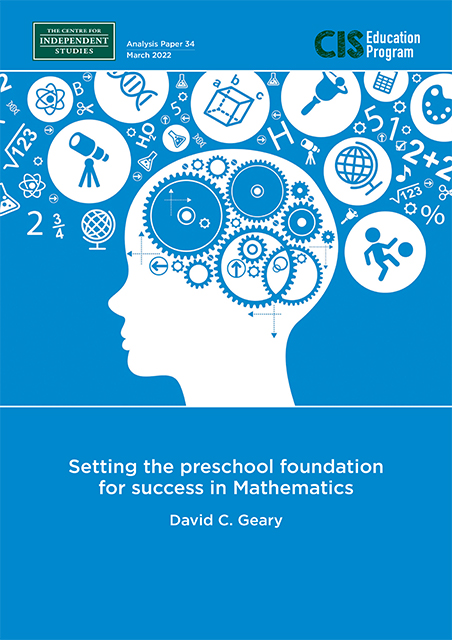
Children’s mathematics competence and maths skills in school impacts on their long-term outcomes at work and in general life. Moreover, those who start school with maths skills behind their peers are likely to stay behind.
Successful school-readiness in mathematics starts during preschool years. Many children are already at-risk of long-term difficulties with mathematics by four years of age.
This paper presents the results of a four-year longitudinal study – including two years of preschool (age 4 years), kindergarten, and first grade – designed to identify the early quantitative competencies that predict readiness to learn mathematics at school entry. The key school-entry competencies include number system knowledge, that is, a network of associations among number words and numerals, understanding their relative magnitudes, and operating on these magnitudes.
This means that children’s school-readiness can be directly observed by children’s count list (i.e., the ability to count, “one, two, three…”), how well they use counting to enumerate (i.e., determine how many) collections of objects, and especially their conceptual understanding of the magnitudes represented by number words and numerals.
Children’s maths skills: key points
- The foundation for this school-entry number knowledge in turn emerges during the preschool years, meaning that many children are already at-risk of long-term difficulties with mathematics by 4 years of age.
- The core early quantitative knowledge that undergirds school readiness appears to be children’s learning of the count list (i.e., the ability to count, “one, two, three…”), using counting to enumerate (i.e., determine how many) collections of objects, and especially their conceptual understanding of the magnitudes represented by number words and numerals.
- Children who lag in the conceptual understanding of the cardinal value of number words start school substantively behind their earlier developing peers, controlling for parental education, verbal and nonverbal intelligence, executive functions, and other factors.
- Parent-child interactions at home facilitate some aspects of early quantitative development, such as learning number words, but most of these activities do not promote the development of cardinal knowledge. Further work is needed to better understand how the home environment fosters the development of this conceptual knowledge.
The findings of this research point to the need for early interventions that target parent-child number-related activities, preschool experiences, and child-centred factors (e.g., to promote better attentive behaviour in classroom settings). Moving forward will likely require the development of multi-systemic interventions that target parent-child number-related activities, preschool experiences, and child-centered factors (e.g., to promote better attentive behavior in classroom settings).
FURTHER READING: Failing to teach the teacher: An analysis of mathematics Initial Teacher Education
Selected references
National Mathematics Advisory Panel. (2008). Foundations for Success: Final Report of the National Mathematics Advisory Panel. Washington, DC: United States Department of Education; Ritchie, S. J., & Bates, T. C. (2013). Enduring links from childhood mathematics and reading achievement to adult socioeconomic status. Psychological Science, 24, 1301–1308.
Duncan, G. J., Dowsett, C. J., Claessens, A., Magnuson, K., Huston, A. C., Klebanov, P. … & Sexton, H. (2007). School readiness and later achievement. Developmental Psychology, 43, 1428-1446; Ritchie, S. J., & Bates, T. C. (2013). Enduring links from childhood mathematics and reading achievement to adult socioeconomic status. Psychological Science, 24, 1301–1308.
Aunola, K., Leskinen, E., Lerkkanen, M. K., & Nurmi, J. E. (2004). Developmental dynamics of math performance from preschool to grade 2. Journal of Educational Psychology, 96, 699-713; De Smedt, B., Noël, M. P., Gilmore, C., & Ansari, D. (2013). How do symbolic and non-symbolic numerical magnitude processing skills relate to individual differences in children’s mathematical skills? A review of evidence from brain and behavior. Trends in Neuroscience and Education, 2, 48-55; Geary, D. C. (2011). Cognitive predictors of individual differences in achievement growth in mathematics: A five-year longitudinal study. Developmental Psychology, 47, 1539-1552; Koponen, T., Salmi, P., Eklund, K., & Aro, T. (2013). Counting and RAN: Predictors of arithmetic calculation and reading fluency. Journal of Educational Psychology, 105, 162–175.










